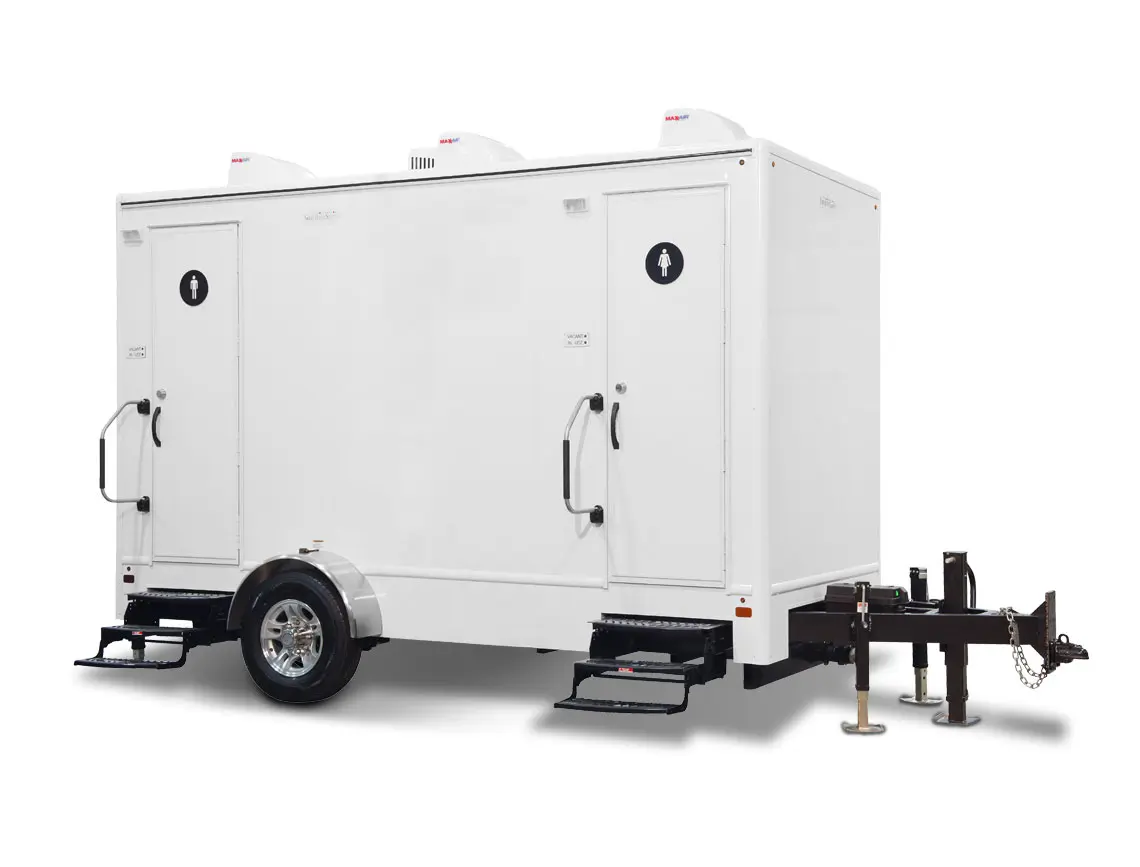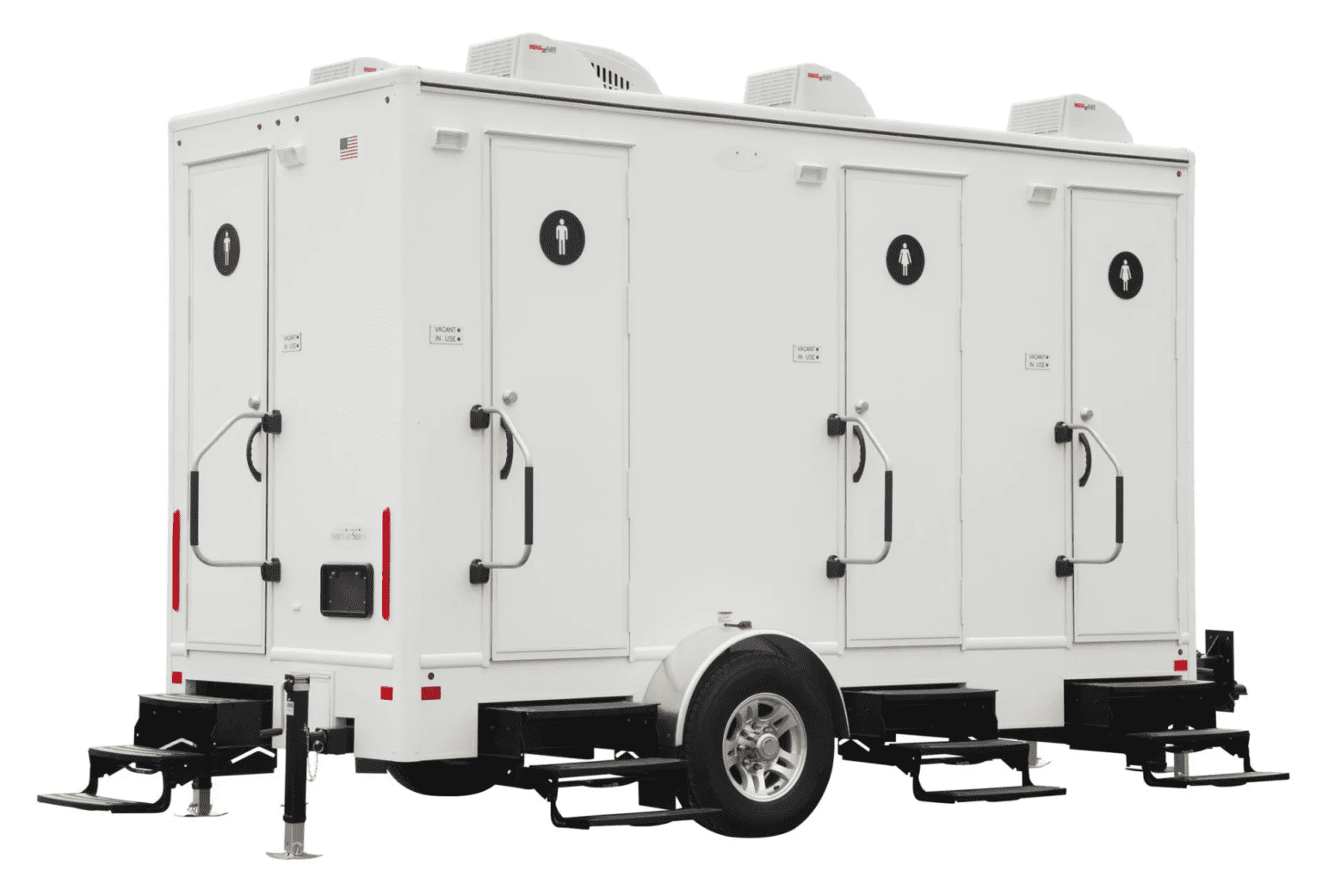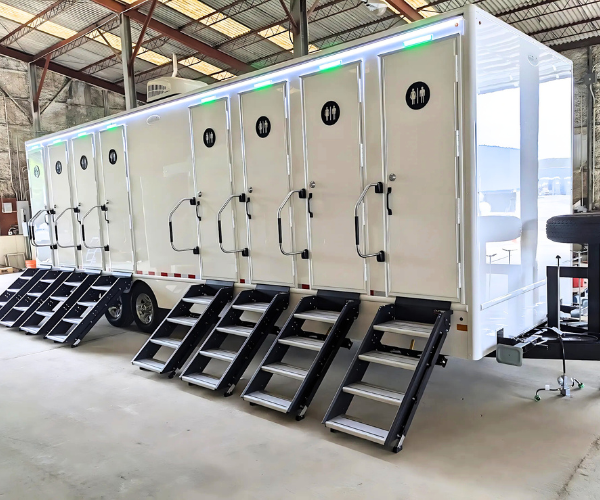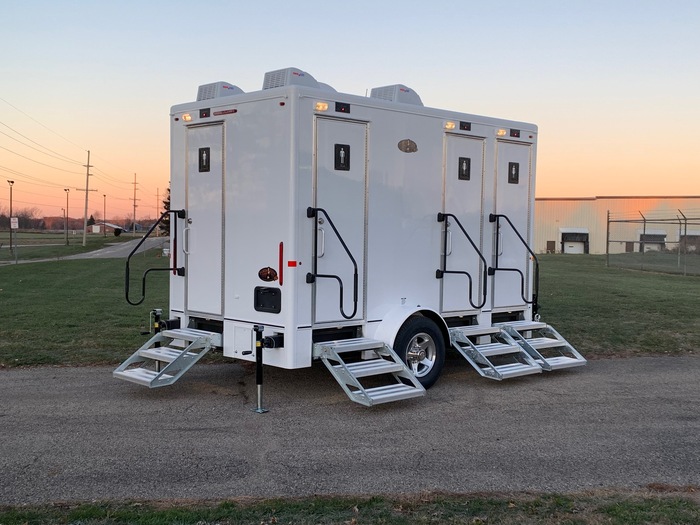Choosing a Restroom Trailer offers numerous eco-friendly advantages, particularly in minimizing the environmental impact associated with temporary sanitation solutions. These trailers are designed with water-saving fixtures, such as low-flow toilets and motion-sensor taps, significantly reducing water consumption compared to traditional portable toilets. Some models incorporate advanced technologies that conserve water, ensuring that every drop is utilized efficiently and with minimal waste. The use of eco-flush systems further enhances their green credentials, providing conventional flushing capabilities with a fraction of the water typically required.In addition to water conservation, Restroom Trailers contribute to reducing environmental harm by utilizing non-chemical-based sanitary solutions. Natural and biodegradable cleaners are employed in the cleaning process, resulting in fewer chemical leachates entering the ecosystem. Additionally, the structural design of these trailers enables effective waste containment and disposal, ensuring that external environments remain unpolluted.Many Restroom Trailers are constructed using sustainable materials that not only reduce the carbon footprint in production but also enhance durability, requiring less frequent replacements and waste accumulation. Recycled materials are often prioritized, aligning perfectly with sustainable building practices. On the operational side, energy-efficient lighting and solar-powered components can be integrated, maintaining electrical needs with minimal external input and reducing dependency on conventional power sources.Aside from their direct environmental benefits, the adoption of these trailers can reflect positively on event organizers, as they provide visible assurance to attendees that responsible environmental stewardship is a priority. This not only appeals to eco-conscious participants but also builds goodwill and reputation for those responsible for their implementation. Utilizing Restroom Trailers can increase overall public awareness regarding sustainable choices, encouraging a broader shift towards environmentally responsible event management. They stand as a testament to how modern conveniences need not compromise ecological integrity but rather complement stewardship efforts towards a greener future.

Restroom Trailer Rentals in Gilchrist County, Florida
Call today for a free quote (352) 660-8775
Restroom Trailer
Fast, Easy, & 100% Free To Get Started
Over 20 Years of Experience
For more than 20 years, our company has established itself as a dependable community partner in Gilchrist County. We focus on providing top-notch restroom trailer services, ensuring customer satisfaction throughout each engagement.
Commitment to Quality Service
Our Restroom Trailer company consistently exceeds customer expectations by delivering top-notch service. We focus on cleanliness, dependability, and professionalism in every facet of our operations.
Swift and Efficient Delivery
We prioritize delivering our restroom trailers promptly, ensuring no hold-ups at your events. Rely on us to efficiently and carefully fulfill your needs with precision.
Modern Restroom Solutions in Gilchrist County
Call for a Free Quote Today
(352) 660-8775
Our Restroom Trailer company proudly serves the Gilchrist County area, offering dependable and locally owned services. We take pride in supporting local events, whether you're organizing a construction site, a lively festival, a private party, or a beautiful wedding. We understand the importance of clean, comfortable facilities, and our modern restroom trailers deliver on this promise with style and functionality. With a reputation built on trust and comprehensive service in nearby areas, you can rely on us to meet your needs promptly and professionally. Ensure the success of your next event by choosing our expert team, committed to making every occasion pleasant for your guests.


2 RestroomsA compact, stylish solution featuring separate entrances for men and women.Each private suite includes flushing toilets, sinks with running water, interior lighting, and climate control for comfort at any event or worksite.(We offer variants 2–10 stalls.)

4 RestroomsDesigned for higher guest capacity, this unit offers four private, individual restrooms with flushing toilets, sinks with running water, interior lighting, and climate control.Ideal for weddings, festivals, and busy job sites.(We offer variants 2–10 stalls.)

8 RestroomsPerfect for large events and high-traffic sites, this spacious trailer provides eight private stalls, each with a flushing toilet, sink with running water, interior lighting, and climate control.A reliable, upscale solution for maximum convenience and comfort.(We offer variants 2–10 stalls.)
We Proudly Serve
Standard Portable Toilets
Porta Serve offers convenient, standard portable toilets across Florida, ensuring cleanliness and comfort on-site.
High Rise Portable Toilets
In Gilchrist County, our high-rise portable toilets are designed for accessibility and efficiency in urban landscapes.
Restroom Trailers
Porta Serve's Restroom Trailers in Gilchrist County provide upscale portable sanitation solutions with luxury and style.
Roll off Dumpsters
Porta Serve's roll-off dumpsters in Gilchrist County ensure hassle-free waste management for large projects and events.
Septic Tank Cleaning
Expert septic tank cleaning by Porta Serve ensures safe and efficient waste processing throughout Florida.
Grease Trap Cleaning
Gilchrist County benefits from Porta Serve's grease trap cleaning services, maintaining sanitary and efficient kitchen operations.
Fencing & Barricades
In Florida, Porta Serve provides fencing and barricades for secure and organized event management.
Residential Storage
Porta Serve offers secure residential storage solutions in Gilchrist County, meeting various personal and business needs.
Gilchrist County Restroom Trailer and More
Obtaining a quote and arranging delivery for our Restroom Trailer service is a straightforward process designed with your convenience in mind. Start by visiting our website, where you'll find 'Get A Quote' buttons readily accessible throughout the pages, ensuring you can initiate a request from anywhere. To receive a tailored quote, customers are prompted to fill out a simple form providing essential information such as first name, last name, phone number, and email. Our commitment to efficiency means that once the form is submitted, our dedicated customer service team will promptly process your request and respond with a comprehensive quote. We prioritize clear communication, thus ensuring you are fully aware of the scope, pricing, and timeline of your rental. Delivery is seamlessly coordinated according to your specified location in Gilchrist County or the surrounding areas, offering peace of mind with timely and reliable service. Whether you need restroom trailers for a large corporate event, a cozy family gathering, or ongoing construction projects, the process from quote to delivery is designed to be as frictionless as possible, allowing you to focus on the more significant aspects of your event planning.

Restroom Trailers are perfect for enhancing the guest experience at any event in Gilchrist County, renowned for its local charm and vibrant community atmosphere. Positioned near the heart of Florida's natural beauty, particularly close to the renowned Ichetucknee Springs State Park, our trailers offer a special touch for outdoor attractions and gatherings, blending convenience with style. Gilchrist County boasts numerous outdoor venues and community events, making our clean, reliable, and convenient restroom trailers an ideal fit for any occasion. Whether it's a rustic outdoor wedding or the lively Gilchrist County Bluegrass Festival, our trailers ensure attendees have access to premium facilities. By choosing our services, you're not just selecting a product; you're opting for a partner that understands the unique character of the region. Let us provide facilities that match the charm and elegance of Gilchrist County's varied landscape. Our commitment to quality ensures that every trailer is equipped to be the top choice in supporting local events with professionalism and care unparalleled in the industry.
Why Choose Us as your top choice for restroom trailers in Gilchrist County? Our local expertise and dedication to quality set us apart. Experience smooth, reliable service tailored to enhance any event in the county's picturesque settings.We pride ourselves on a reputation built over years of unfailing service and customer satisfaction. Let us handle your restroom needs with professionalism and a commitment to excellence unmatched in the region.Opt for our trailers for comfort and luxury at your event. With seamless service and robust local support, you can focus solely on the success of your event.Our dedication to top-tier service distinguishes us above the rest, ensuring that each detail aligns with your visions and requirements. Bring us on board and feel the difference our experience makes.
Fast and Reliable isn't just a slogan; it's the backbone of our service philosophy for delivering Restroom Trailers. Trust our team for the swift deployment of meticulously maintained facilities that adhere to strict standards.Our expertise guarantees that, whether you need a speedy solution for a small gathering or a major event, every client receives our unwavering dedication to swift, precise concierge-style service.Expect prompt, responsive communication from our committed team, ensuring your set-up is ready exactly when needed.We are passionate about timely service, which boosts the efficiency and success of diverse events, perfectly mirroring our clients' requirements.
Learn More About Our Restroom Trailer in Gilchrist County
Renting a Restroom Trailer in Gilchrist County is designed to be straightforward and customer-friendly. Begin your rental process by visiting our website, where prominently placed 'Get A Quote' buttons are available to guide you seamlessly from start to finish. These forms are easy to access, both at the top and bottom of our pages, ensuring you never have to search far for them. Simply click on them to begin.The form is straightforward and collects essential details, including your first name, last name, phone number, and email. Once submitted, our service team promptly reviews your information and reaches out to discuss your specific needs and tailor solutions accordingly. Our aim is to simplify this experience as much as we can for our customers, ensuring ease and fast response.Upon submitting your requirements, you'll receive a prompt quote crafted to reflect your unique demands, ensuring that you receive fair pricing and a detailed overview of the service specifics. Our team assists by providing clear guidance on the next steps, ensuring a smooth and efficient process.Our wide range of trailers can cater to events of all sizes and types, from small intimate gatherings to large-scale production requirements. We pride ourselves on offering the exact right solution, ensuring satisfaction from initial inquiry through to delivery. Count on us to oversee the logistical details, allowing you to focus on the event at hand.Once your rental plan is set, expect timely and professional delivery and installation of the restroom trailer to your specified location. Our experts ensure each unit is fully operational and positioned correctly to fit into the flow of your event. By entrusting us with your restroom trailer rentals, you're ensuring a hassle-free, efficient partnership that enhances the quality of your events.
Understanding the typical delivery timeframe for Restroom Trailer orders is crucial for planning purposes, and we come prepared to address this right from the start. Our approach is to ensure timeliness coupled with dedicated customer service, which is orchestrated seamlessly from your order initiation.Once your order for a restroom trailer is confirmed, our support team coordinates the logistics ensuring swift and reliable service. Typically, you can expect delivery within a few days of order completion, allowing you ample time to prepare your event space. We understand that the pacing of event preparations can often be time-sensitive, so we aim to exceed expectations.In the rare instance of constraints such as weekend orders or specific location requirements that necessitate unique logistical considerations, our team engages actively with you to manage potential adjustments. Clear communication is key, and you'll receive updates on your trailer's progress and anticipated arrival from our dedicated service staff.During peak seasons, such as large community fests or corporate events coinciding with your rental, we recommend early bookings. This ensures the preferred unit types and configurations are available and delivered according to your needs. Our extensive inventory enables us to cater effectively to a wide range of demand scenarios.Our delivery commitment is not solely restricted to timing; it encompasses every aspect of service execution: securely transporting the trailers, setting them up at your site with care, and ensuring that each unit is fully operational per your event's unique requirements. We make certain that your event features clean and ready-to-use facilities for your guests without worry, stress, or undue delay.
Yes, we are fully equipped to service any type of event or construction service, specializing in varied settings and requirements. Our capacity to deliver support extends across several dynamic scenarios including festivals, sporting events, weddings, corporate occasions, family reunions, and an assortment of special gatherings. Our extensive product range is designed to cater to different facets of such events with ease and efficiency.Among our service offerings, you'll find luxury restroom trailers that provide high-end sanitary solutions for VIP gatherings and upscale weddings. For broader venue support, traditional porta potties allow broad reach and accessibility to adequate facilities. Additionally, our roll-off dumpsters provide reliable waste management solutions to ensure site cleanliness and order.Through the provision of fencing and barricades, we offer structural support for crowd control and space delineation, ensuring clear event organization and safety. Complementary offerings like holding tanks, ADA units, portable sinks, and hand sanitizer stations emphasize our commitment to complete service packages that accommodate all event needs.Operated by experienced personnel, our services are adaptable and tailored to meet the specific demands of your project with professionalism and care. Whether you require facilities for short-term projects or longer-term engagements, our consistent service clean-up and on-time delivery ensure peace of mind and operational fluidity.Our team is committed to adapting our products and services to serve any scale of requirement with excellence, ensuring each experience aligns closely with customer preferences and needs. Choose us to reliably enhance your event's operational potential and guest satisfaction.

